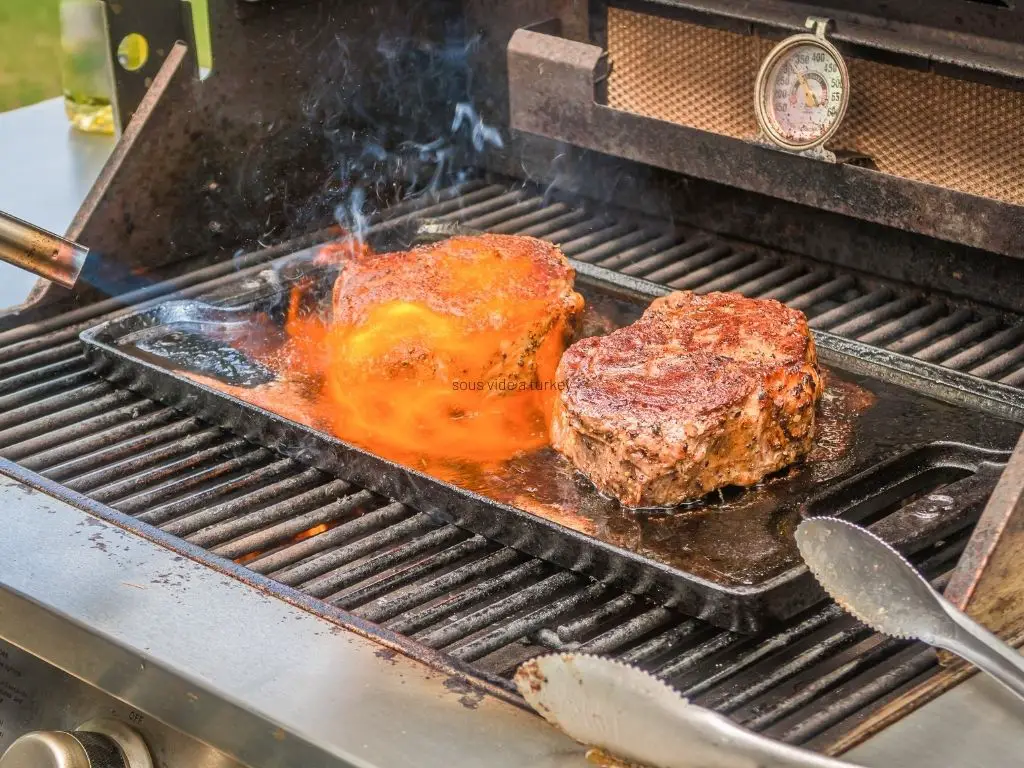Sous vide cooking produces incredibly tender, juicy, and evenly cooked steak, but lacks the delicious browned crust that searing over high heat creates. Using a kitchen torch is the perfect way to get the best of both worlds – the precise doneness control of sous vide, and the crispy, flavorful sear from torching.
Here’s why finishing your sous vide steak with a torch is a great technique:
Maillard Reaction: Torching rapidly heats the exterior of the steak, kickstarting the Maillard reaction that produces browning and complex flavors. This adds both visual appeal and tasty flavor that sous vide alone can’t achieve.
Texture: The high heat of the torch causes the exterior of the steak to caramelize and crisp up. This adds appealing texture contrast against the uniformly tender interior.
Quick & Easy: Torching is fast, convenient, and easy. In just a minute or two you can sear all sides for a perfect crust. Much simpler than firing up the grill or pan.
Controlled Conditions: A kitchen torch allows you to precisely control the sear, avoiding overcooking that can happen on grills or in smoking hot pans. No worrying about cold spots either.
Works For Any Cut: Whether it’s a tender filet mignon or a fatty ribeye, the torch’s concentrated heat sears any cut of steak evenly. No need to adjust for different thicknesses.

Sous Vide Products I Use Every Day
As an Amazon affiliate, I earn from qualifying purchases.
Last update on 2024-07-26 / Affiliate links / Images from Amazon Product Advertising API
Equipment Needed for Torching Steak
To properly torch steak after sous vide cooking, you need just a few pieces of essential equipment:
1. Sous Vide Machine
A sous vide immersion circulator or water bath controller is necessary for the initial low and slow cooking of the steak in a precision temperature water bath. This cooks the steak edge-to-edge with perfect uniformity.
2. Kitchen Torch
The best torch for searing sous vide steaks is a butane culinary torch, which produces a concentrated flame up to 2,500°F. Butane reaches higher temperatures than propane, leading to better searing.
3. Butane or Propane Fuel
Refilling the torch’s fuel canister with butane or propane allows for sustained use during the searing process. Always have backup fuel on hand.
4. Tongs
Tongs allow you to easily flip and maneuver the steak during searing without burning your fingers on the hot surface.
5. Heat-Resistant Surface
Sear the sous vide steak on a surface that can withstand the heat of the torch flame, like a cast iron or stainless steel pan.
Step-by-Step Guide to Torching Steak After Sous Vide
Follow these simple steps for perfect results when using a torch to sear steak after sous vide cooking:
1. Prepare the Steak for Sous Vide Cooking
Season the steak with salt and any other spices or aromatics at this stage. Vacuum seal in a sous vide bag, removing excess air.
2. Sous Vide Cook the Steak
Set your sous vide device to the target temperature (like 130°F for medium-rare). Immerse the bagged steak and cook for 1-4 hours depending on thickness.
3. Remove the Steak from the Sous Vide Bag
Take the steak out of the sous vide bag and pat it very dry. Drying the surface helps achieve an excellent sear.
4. Pat the Steak Dry
Use paper towels to pat off any moisture from the steak’s surface. Getting it as dry as possible is key for proper torch searing.
5. Prepare the Torch and Workspace
Assemble your torch setup in a well-ventilated area on a heat-safe surface. Have tongs nearby and fuel your torch.
6. Torch the Steak
a. Searing the First Side
Hold the torch about 2 inches from the steak. Move the flame slowly and steadily across the steak’s surface until well browned.
b. Searing the Second Side
Use tongs to flip the steak and repeat the searing process on the un-seared side.
c. Searing the Edges
Carefully sear the thin sides of the steak as well, holding the flame at a slight angle.
7. Let the Steak Rest
Let the steak rest for 5-10 minutes before slicing to allow juices to redistribute. This improves tenderness.
8. Serve and Enjoy
Slice into the steak and dig in! Enjoy the sous vide tenderness and juicy center with the delicious browned crust.
Tips for a Perfectly Torched Steak
Follow these tips when using your torch to sear sous vide steak for the best possible results:
1. Choose the Right Torch
A culinary butane torch that reaches temperatures around 2,500°F is ideal. The higher heat ensures better Maillard reactions.
2. Maintain a Safe Distance
Keep the torch nozzle about 2 inches from the steak as you sear. Too close will burn the surface; too far won’t brown sufficiently.
3. Keep the Flame Moving
Continuously moving the flame prevents burning or uneven searing. Maintain a smooth, steady motion.
4. Don’t Overcook the Steak
Avoid excessive searing after sous vide. You want to brown, not continue cooking the interior. Work quickly.
5. Experiment with Seasonings and Marinades
The Maillard reaction will develop more complex flavors if spices are applied before searing.
Conclusion: Enjoying the Perfectly Torched Steak After Sous Vide
Browning steak with a sear torch is a quick, foolproof way to put the finishing touches on a juicy, tender, evenly cooked sous vide steak. With precise control over the high heat of the torch, you can create a flavorful, texturally pleasing crust in just minutes without overcooking. Master this simple technique and enjoy restaurant-quality steaks anytime at home. The combination of sous vide precision and torch searing delivers absolutely perfect results every time.


![IMPRESA [10 pack] Sous Vide Magnets to Keep Bags Submerged & In Place - Sous Vide Accessories to Stop Floating Bags & Undercooking - Great Alternative to Sous Vide Weights, Balls, Clips, & Racks](https://m.media-amazon.com/images/I/41zHpl8G2lL._SL160_.jpg)


